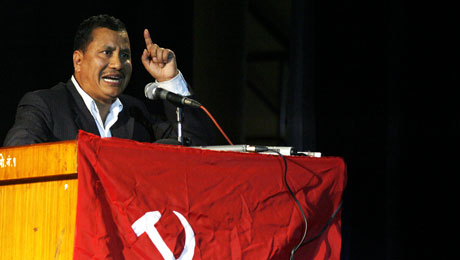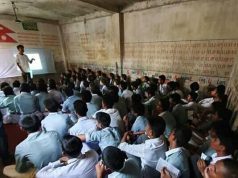The violent attack on an INGO office this week is based on a now-defunct ideology
June 9, 2016
A group of people hurled a petrol bomb at the office of Save the Children, an INGO, in Chautara, Sindhupalchok on Monday night. While those involved in the attack have not been apprehended, the police recovered pamphlets of the breakaway Maoist party led by Netra Bikram Chand from the site. Three buses were torched in Butwal on Tuesday night.
There is strong reason to believe that Chand’s supporters were responsible for these attacks. The style of the attacks was very similar to others committed by the Maoists in the mid-1990s. Further, Chand and his supporters have never made secret their desire to stage a violent revolution to capture state power. These facts indicate that the attack in Chautara was carried out by Chand’s men, and possibly women.
In recent months, the Maoist party led by Chand, aka Biplav, has not only carried out sporadic assaults on government officials but has also been involved in extorting money from the public. This seems to be the first time at least since the 2013 CA elections (which was boycotted by the radical Maoist faction led by Mohan Baidya, of which Chand’s group was a part at the time) that a Maoist faction has used explosives. In that respect, the move on Monday marks a symbolic start to a new campaign.
Needless to say, a violent movement against state power of the kind that Chand and his people envisage is no longer possible in Nepal. The security forces are much stronger than before, and the faction’s leaders are well recognised, making it difficult for them to go into hiding. The Chand group perhaps recognises this and states that the new struggle will be ‘jointly conducted’ in both the urban and rural areas and ‘the middle class will be taken into confidence’.
But it is clear that the Maoist ideology of the past is now defunct and has found very little resonance across society. The vast majority of the population has no appetite for any kind of violence. The rhetoric of the Chand Maoists, which emphasises class struggle and is virulently opposed to most foreign countries and I/NGOs, is also completely outdated.
That said, it must be noted that Chand has succeeded in capturing the minds of some of the most ideological sections of the Maoist party. His faction’s cadres include many Maoist members who were underground during the conflict and have become gravely disillusioned with a level of dysfunction and corrupt nature of contemporary politics. The ruling class needs to be mindful that there are still some people who are willing to take recourse to a violent movement against state power; that the poor state of our state fuels anger in some. The Nepali state especially needs to be mindful of the fact that the disenchanted Maoist ex-combatants (who are left without livelihood support, social safety, etc) could be easy targets for recruitment and regrouping for the likes of Chand.
Still, the members of the Chand faction should listen closely to the views of the population they seek to mobilise and come to the realisation that the path they have chosen will lead them nowhere but to a dead end.







